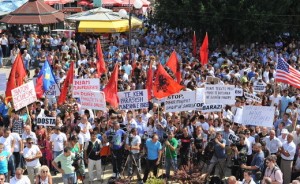 But many are furious and argue Pristina’s concern for the Albanians in the Presevo Valley does not compare to Belgrade’s policy and care for the Serbs in Kosovo. People in the Presevo Valley seem particularly impacted and oppose the Kosovo and Serbia governments’ decision to implement the agreement.
But many are furious and argue Pristina’s concern for the Albanians in the Presevo Valley does not compare to Belgrade’s policy and care for the Serbs in Kosovo. People in the Presevo Valley seem particularly impacted and oppose the Kosovo and Serbia governments’ decision to implement the agreement.
Monday, 30 April 2012
Expensive car insurance instituted last December has hindered Serbia-Kosovo cross-border transportation, stirring a furious debate about its economic impact on both sides of the border.
The measure, implemented per the EU-sponsored 2011 Belgrade-Pristina agreement to ease freedom of movement, stipulates that all vehicles entering Serbia from Kosovo pay an insurance fee of 100 euros a month.
Those entering Kosovo from Serbia pay 105 euros, with an option for a two-week, 60-euro fee.
Traffic from Serbia to Kosovo in the first four months of this year has been cut in half compared to the same period last year, from 348,000 down to less than 165,000 vehicles, Kosovo police said.
“I travel with my car only to Gjilan. Then, I take a taxi or hop on a bus to cross the border to Presevo,” Fatlum Ahmedi, a Pristina-based IT specialist, told SETimes.
Ahmedi said he used to visit his parents in the adjacent Presevo Valley in Serbia almost every other weekend, but said he rarely goes now.
Demand for bus and taxi services has increased, as have the fares.
“It is a fact that we are working more now, but we are also paying more,” taxi driver Jeton Jusufi told SETimes.
 People in the Presevo Valley seem particularly impacted and oppose the Kosovo and Serbia governments’ decision to implement the agreement. They said the high insurance fee is preventing them from maintaining family, trade and economic relations with Kosovo.
People in the Presevo Valley seem particularly impacted and oppose the Kosovo and Serbia governments’ decision to implement the agreement. They said the high insurance fee is preventing them from maintaining family, trade and economic relations with Kosovo.
“My brother-in-law teases me it is cheaper for him to enter Kosovo as a Swiss resident than me,” Arben said. Residents from states other than Serbia pay 45 euros per month for vehicle insurance in Kosovo, Arben added.
Political representatives from three Albanian-dominant municipalities in southern Serbia travelled to Pristina to express their concerns and meet with Deputy Prime Minister Hajredin Kuqi.
After the meeting, Kuqi promised the government will consider the possibility of lowering the vehicle insurance fee.
But many are furious and argue Pristina’s concern for the Albanians in the Presevo Valley does not compare to Belgrade’s policy and care for the Serbs in Kosovo.
“[Prime Minister Hashim Thaci] must take an example from [Serbia’s former President Boris] Tadic how the interests of his nation must be protected,” blogger Bekim Ahmeti said, summing up the view of many.
The issue has provoked newspaper readers to contribute articles. Fehmi Ramadani said the net effect of the agreement on freedom of movement is “the ghetto of Albanians in the valley”.
“Instead of enjoying the agreement, they are pushed deeper into ghetto and isolation,” he said.
Some said the matter goes beyond economics and politics. Cost can not be a deterrent to maintaining human relations, according to anonymous, and the important thing is to be willing and allowed to cross the border. “For those having a partner from Gjilan or Presevo, even 100 euros is nothing to go and see the family,” he said.
A small group of Albanians from Presevo organised a protest last month at the border crossing with Kosovo against the high insurance fee, arguing the charge is not affordable for most. “Help the valley, do not let us be isolated,” read the placards.
But Boye argued protests are an ineffective means of dealing with the problem. His recommendation: “Albanians there should not complain against high car insurance fees. They should ask for dual citizenship, the right for a Kosovo passport and citizenship.”
















